Growing, Learning and Achieving together.
Our Shared Values:
In our school community we all work together to ensure that everyone is: Safe, Healthy, Active, Nurtured, Achieving, Responsible, Respected, Included.
Our Shared Aims:
- To make sure everyone is included and given equal opportunities to learn and achieve.
- To be well behaved and show good manners.
- To make learning fun and exciting but also challenging.
- To be supportive and encouraging, work co-operatively as a team and on our own.
- To feel happy and confident when learning, taking risks and making mistakes.
The school Vision, Values and Aims were developed through gathering responses from our pupils, parents and staff to the following key questions:
- Which three words would you use to describe our school?
- Which three qualities/skills do you think our pupils should have by the end of Primary 7?
The Wordles below collate the responses given: Which three words would you use to describe our school?
Parent/Carer responses:
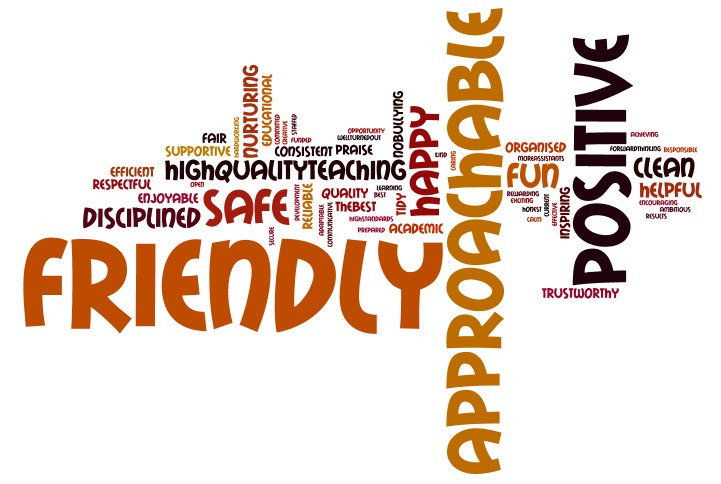
Pupil responses:
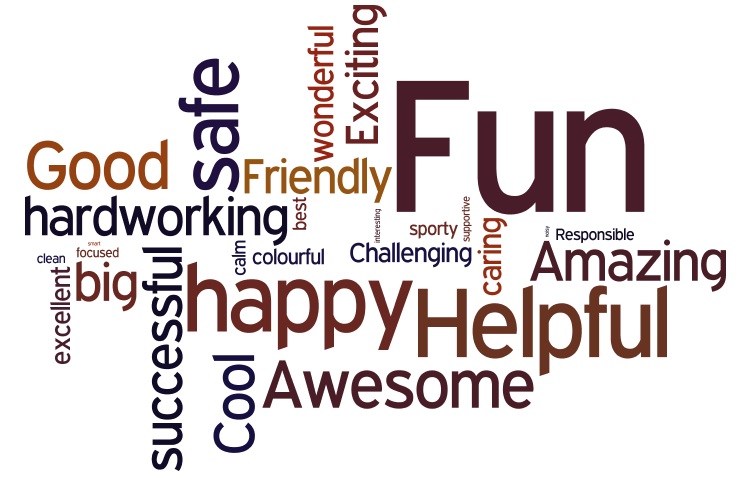
Staff responses:
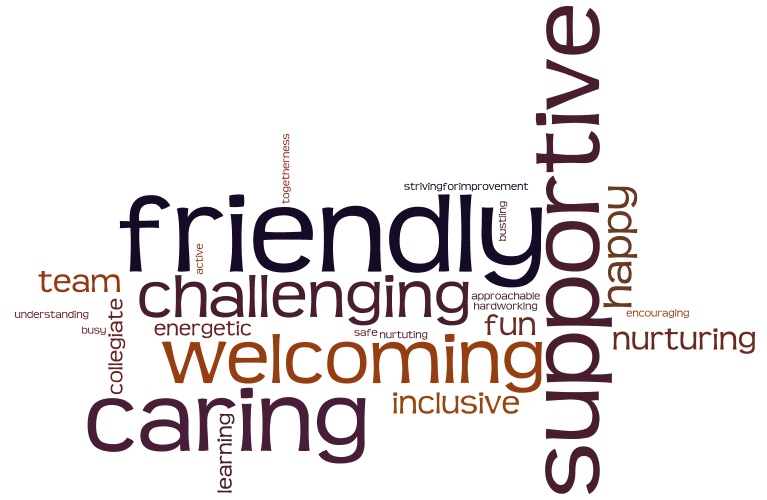
Which three qualities/skills do you think our pupils should have by the end of Primary 7?
Parent/Carer responses:
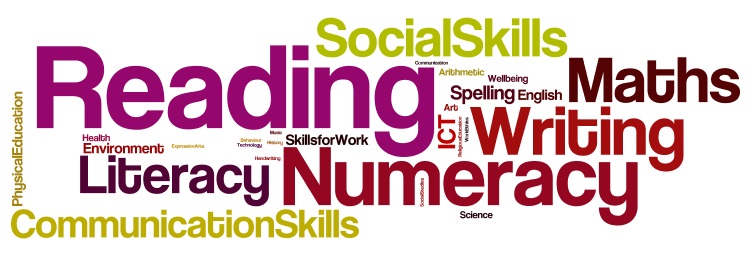
Pupil responses:
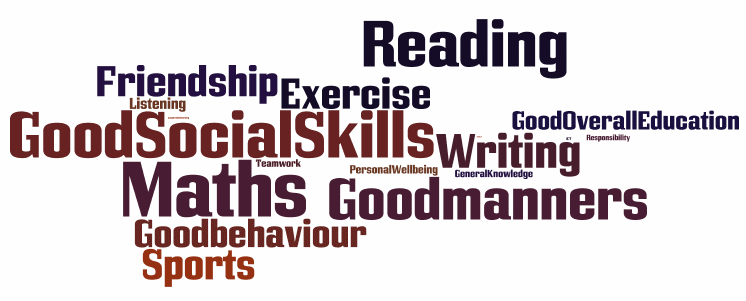
Staff responses:
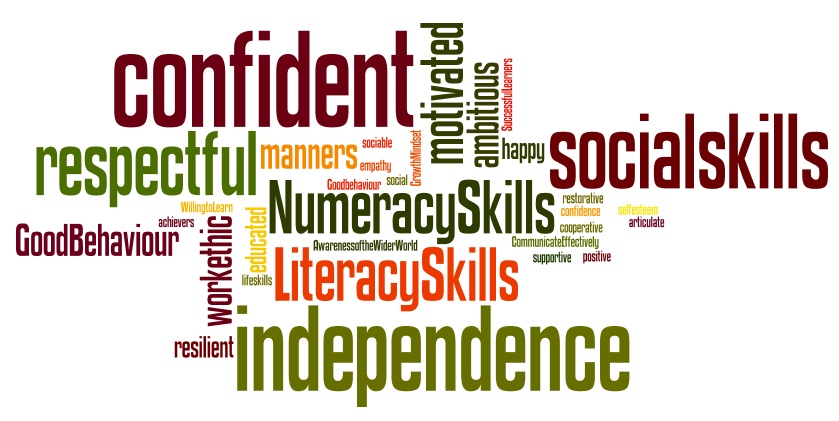
Strathmore’s four contexts for learning
Ethos and Life of the school as a community
We are a school that celebrates diversity and welcomes all pupils and their families into our school. Visitors to our school always comment and praise us for our inclusive, caring and approachable manner. In Strathmore we strive to build positive relationships with everyone within our community. We have very positive and strong links with our parents/carers, East and Old Church and other professionals who are able to further support us in providing our pupils with the best outcomes in their learning, health and wellbeing and personal growth. Partnerships with parents are important to us and we build these through the ‘Strathie café’ led by our Parent Council, regular parents helpers at Golden time, in our library and within our working groups along with opportunities throughout the session where parents are invited into the school to celebrate and share learning. Our school has a very successful positive behaviour system, Good to be Green, which was created in consultation with our staff, pupils and parents/carers. Links to Restorative Approaches has been made to further enhance the GTBG system. GTBG continues to be enhanced through regular review and evaluation by our Health and Wellbeing Group where pupils are able to express their views and support further improvements within our school. Our pupils are supported in their learning through a variety of ways from Nursery to P7 to ensure that they progress and achieve success, e.g Cosy Corners in our Nursery, our Nurture Room for early years to enhance social skills in small groups, use of nurturing principles within our classrooms, Circle and Bubble Time and various approaches to support pupils in their learning. Our school supports and encourages a variety of extra-curricular links led by school staff, our Active School Co-ordinator and activities within the community.
Curricular Areas and Subjects
All teaching staff plan and deliver learning within all of the subjects; Literacy, Mathematics and Numeracy, Health & Wellbeing, Expressive Arts, Sciences, Social Studies, Technologies and Religious and Moral Education. In Strathmore, we place high importance on Literacy, Mathematics & Numeracy and Health & Wellbeing, this links with the expectations that our staff, pupils and parent/carers shared while creating our Curriculum Rationale. The staff are supported in their planning through progression pathways (Literacy & Mathematics & Numeracy) which have been devised to support the breadth and progression of learning for pupils across each of the Curriculum for Excellence (CFE) levels. These progression pathways link to the Angus Standards which are used to assess and identify pupils who are secure in the learning at the end of each CFE level (P1 – Early; P4- First; P7 Second). In Strathmore we developed our progression pathways to further ensure high and consistent expectations on pupil learning. Each pathway determines what a child should achieve in their learning at the end of each stage in the primary school. In session 2016/17 the staff will work on developing the Progression pathway for Health & Wellbeing. Improvements have been made in the resources available for staff to ensure effective learning and teaching across Literacy and Numeracy. We have a new reading scheme in place (Oxford Reading Tree) with additional schemes available to ensure breadth and depth of skills along with novels in First and Second level. Spelling and phonic resources have been supplemented with links made to Jolly Phonics and Jolly Grammar across the school. Teaching staff have access to Active Heinemann as the main teaching resource for Numeracy along with other approaches and teaching tools to support all pupils in this curricular area.
Interdisciplinary Learning
Interdisciplinary learning is when teaching and learning make connections across the curriculum, exploring clear and relevant links. This approach supports the transferring of learning and skills into other areas or new situations. It provides opportunities for learners to deepen their learning through exploring issues, solving problems or completing a final task or project. In Strathmore interdisciplinary learning is mainly planned for within the topic that the children are learning about. For example, the children may be completing a science experiment about forces on how far an object made up of different materials can travel down a ramp. In this task they will be using their mathematical skills to estimate the distance, measure the actual distance travelled in centimetres and then will use their literacy knowledge to writing a report on the results of the experiment and what they learned. Throughout this interdisciplinary learning the children will be covering experiences and outcomes in Science, Technology, Mathematic & Numeracy and Literacy. In Strathmore we seek to promote natural links between subjects and provide interesting and innovative contexts for learning. These often link to the world of work or to local or national events that are of particular significance to the pupils.
Opportunities for Personal Achievements
All staff encourage pupils to share and talk about their achievements in school and out-with. These successes are shared at Assemblies and each department and some classes have displays were this information is presented. In school, we present weekly ‘Stars of the Week’ for children who have strived to achieve the focus of the week, which is most often linked to a social skill. The Nursery have a graduation celebration in the Summer term and the school has a Prize Giving which celebrates and gives recognition to a variety of pupil achievements, this is attended by parent/carers and those from within the community who support our school on a regular basis. Our pupils are encouraged to participate in cluster events (sporting, Rotary quiz, taster sessions) and national competitions such as Rock Challenge, Badminton, Lego Tech, all of which support and encourage our pupils to opt into extra-curricular activities within the community of Forfar. When planning for the learning the staff complete KWL charts to build on previous learning and skills, this also allows consideration of personalisation and choice, where some pupils are given the opportunity to identify areas for personal research linked to their topic work. Pupils are being further encouraged to present and showcase their learning to peers and adults within the school community through school assemblies, school concerts, Rock Challenge, Heavenly Bites, drama workshops and our Scot’s poetry competition. Personal achievements are now starting to be recorded within each child’s Learning Log which is shared with home throughout each school session.
Information for parents/carers.
Each class was also asked to complete a ‘stars’ and ‘wish’ list identifying what they thought was good about the school (star) and what they thought could be done to make our school even better (wish).
The pupils, during class visits and assemblies, also gave their individual/group responses to the following questions:
- What would the pupils be like in an excellent school?
- What would the staff be like in an excellent school?
- What would learning and teaching be like in an excellent school?
- What would an excellent classroom look like?
- What would an excellent playground be like?
We have also made use of the feedback that parents/carers have given to us at various times during the year, for example completed questionnaires, post it notes completed at parent meetings, meet the teacher evenings, curricular awareness sessions (Good to be Green and Internet Safety), liaising with our Parent Council at events and meetings.
All of the information gathered from pupils, parents/carers and staff has been used to develop our Curriculum Rationale and our Curriculum Plan.
What do we mean by a Curriculum Rationale and Curriculum Plan?
Our Curriculum Rationale defines what we want our pupils in Strathmore to achieve during their time with us. It captures what is unique to our school context and the community within and around our school e.g. links within the community such as Barbara Ann our school Chaplain, local businesses such as Asda, use of resources to enhance learning such as Forfar Loch, Leisure facilities, Murton Farm, Guide Dog Centre, etc.
The Curriculum is the totality of experiences which are planned for children and young people through their education, and wider opportunities for learning. The totality of the curriculum is captured through the four contexts for learning, which are:
- The Ethos and life of the school community
- Curriculum areas and subjects
- Interdisciplinary learning
- Opportunities for personal achievement
Building upon our Curriculum Rationale, we have a Curriculum Plan which is continually being developed and reviewed over a three year period. The Curriculum Plan determines the focus for our curriculum development over a three year period. Each year within these 3 years key actions will contribute to the annual School Improvement Plan.
This means that in Strathmore we are always looking at what we need to do to improve the learning for our children and young people, deciding upon what we want to change and how we are going to achieve this. The voices of our pupils, staff and parents/carers are very important in this process of improvement and this is why we seek your feedback at various points within the year, in a number of ways.
Our Curriculum Plan is shared at our parent Council meetings along with our annual School Improvement Plan.


.jpg)